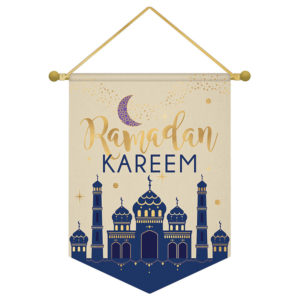Ramadan is upon us, and it brings about a number of changes for expats living in the UAE. It is a significant month of the Islamic calendar, and a wonderful opportunity to understand and embrace the local culture. If this is your first Ramadan, refer to our handy Expats Ramadan Guide!
When does Ramadan start and finish?
The first day of the Holy Month of Ramadan starts by the sighting of the crescent moon. An official announcement will be made by the moon-sighting committee in Saudi Arabia, and the rest of the Islamic world follow this declaration.
Ramadan continues for one complete moon cycle, therefore usually 29 or 30 days. The sighting of the moon determines the duration, and it starts accordingly. Immediately following Ramadan is Eid Al Fitr, an annual three-day celebration. The government will announce the official public holiday dates.
How is Ramadan observed?
Capable, adult Muslims of good health fast from dawn until sunset every day. The practice of fasting means that Muslims may not eat or drink anything, including water. There are some exemptions to fasting; those who are elderly, unwell, pregnant, menstruating or breastfeeding. Children will generally not fast until they reach puberty (although many choose to do so).
During Ramadan, Muslims also refrain from smoking, sexual relations, sinful speech and behavior such as gossip, fighting and lying. They will increase worship, and pray every night for 30 days. Ramadan is a time of giving, and Muslims will also increase charitable activities.
Breaking the fast
Muslims break their fast at sunset, at the time of call for prayer. The fast is broken with a social meal called Iftar. Traditionally, first thing to eat is dates, along with water. Then they get to soup and main dishes, juices and desserts. Restaurants offer Iftar to Muslim and non-Muslim residents, and is a pleasant experience.
Each morning before sunrise, Muslims will engage in Suhoor. Eating a healthy meal at this time enables them to fill up adequately, and endure good health for the rest of the day.
What is the correct greeting to use?
Greet people by saying “Ramadan Kareem” or “Ramadan Mubarak.” Both of these mean that you are wishing people a blessed and generous Ramadan.
Work hours and opening times
In general, working hours are reduced during the month, regardless of whether or not they are observing Ramadan. The work day is generally reduced by two hours. School timings will also be affected. Some businesses adjust their hours for Ramadan, so timings of stores, services, public transport and paid parking may vary. Malls remain open (with the exception of food courts and eateries), and may even stay open later than usual. Supermarkets and grocery store hours are normal, and you can follow your usual food shopping procedures.
Eating during the day
Non-Muslims to show respect for those who are fasting, by refraining from eating or drinking in front of them. This applies to public situations, as well as the workplace. Within schools, fasting children will have separate, designated areas for usual break times.
Some restaurants and cafes are open for normal dine-in options during Ramadan. All food and beverage outlets must obtain a special license, and operate discreetly with curtains or window block-outs so that all consumption is hidden from the public. Many places offer take-away options to eat privately elsewhere.
Overall, the basic Ramadan etiquette is as follows:
- 1| Do not eat, drink or smoke in public during the hours of fasting. Note also that chewing gum is considered as eating.
- 2| Avoid eating or drinking in your car. Although it is your private property, you are still visible to the public.
- 3| Dress respectfully. Women should cover their knees and shoulders in public, and men should avoid wearing sleeveless shirts.
- 4| Do not demonstrate public displays of affection.
- 5| Do not play music or dance in public.
- 6| Don’t swear or exhibit any aggressive behavior.
- 7| Do not refuse a gift or an invitation to join a Muslim family at Iftar.
Please note there are penalties for not adhering to the Ramadan etiquette. As a non-Muslim guest of the UAE, make the most of the community spirit, and immerse yourself in the cultural activities taking place during the Holy Month.











A clear and helpful guide that supports expats in experiencing Ramadan fully and meaningfully. Perfect for anyone navigating new traditions with confidence.
Great V I should certainly pronounce, impressed with your web site. I had no trouble navigating through all tabs as well as related information ended up being truly easy to do to access. I recently found what I hoped for before you know it in the least. Quite unusual. Is likely to appreciate it for those who add forums or anything, site theme . a tones way for your client to communicate. Excellent task..
This is really interesting, You are a very skilled blogger. I’ve joined your feed and look forward to seeking more of your great post. Also, I’ve shared your site in my social networks!
Thanks for every other excellent article. The place else may just anyone get that type of information in such a perfect means of writing? I have a presentation next week, and I’m on the look for such info.
I?¦ve been exploring for a little bit for any high quality articles or blog posts on this kind of house . Exploring in Yahoo I finally stumbled upon this web site. Reading this information So i?¦m satisfied to exhibit that I’ve an incredibly excellent uncanny feeling I found out just what I needed. I most for sure will make sure to don?¦t fail to remember this web site and give it a look on a continuing basis.
LottoChamp is a lottery prediction software that uses statistical analysis and mathematical algorithms to help users choose more strategic numbers when playing the lottery.
I want meeting useful info, this post has got me even more info! .
Thanks for the auspicious writeup. It if truth be told used to be a enjoyment account it. Glance complicated to more introduced agreeable from you! By the way, how could we be in contact?
I’d constantly want to be update on new posts on this website , saved to my bookmarks! .
Glad to be one of the visitors on this awesome site : D.
Only wanna input on few general things, The website layout is perfect, the content material is very fantastic. “All movements go too far.” by Bertrand Russell.
Mitolyn is a cutting-edge dietary supplement designed to restore energy at the cellular level. Unlike typical energy boosters that rely on caffeine or sugar, Mitolyn supports your body’s natural ATP production, the real fuel your cells use for energy.
Mitolyn is a cutting-edge dietary supplement designed to restore energy at the cellular level. Unlike typical energy boosters that rely on caffeine or sugar, Mitolyn supports your body’s natural ATP production, the real fuel your cells use for energy.
Hey just wanted to give you a quick heads up. The words in your article seem to be running off the screen in Opera. I’m not sure if this is a formatting issue or something to do with web browser compatibility but I figured I’d post to let you know. The design look great though! Hope you get the problem resolved soon. Many thanks
Its like you read my mind! You appear to know so much about this, like you wrote the book in it or something. I think that you can do with some pics to drive the message home a bit, but instead of that, this is wonderful blog. An excellent read. I’ll certainly be back.
The Pink Salt Trick is a minimalist but effective morning routine: Just drink a glass of lukewarm water mixed with a pinch of Himalayan pink salt as soon as you wake up.
You are my inspiration, I own few blogs and very sporadically run out from post :). “To die for a religion is easier than to live it absolutely.” by Jorge Luis Borges.
The Pink Salt Trick is a minimalist but effective morning routine: Just drink a glass of lukewarm water mixed with a pinch of Himalayan pink salt as soon as you wake up.
You have remarked very interesting points! ps decent internet site. “Mediocrity knows nothing higher than itself, but talent instantly recognizes genius.” by Conan Doyle.
Good article and straight to the point. I don’t know if this is actually the best place to ask but do you folks have any ideea where to hire some professional writers? Thank you 🙂
Great beat ! I would like to apprentice at the same time as you amend your site, how can i subscribe for a blog web site? The account aided me a appropriate deal. I had been tiny bit acquainted of this your broadcast offered shiny transparent concept
I do like the way you have presented this specific matter and it really does provide me a lot of fodder for thought. Nevertheless, from what I have observed, I just trust as other responses stack on that people remain on issue and not embark on a tirade regarding some other news du jour. Anyway, thank you for this excellent piece and whilst I can not necessarily go along with this in totality, I respect your perspective.
I have not checked in here for some time because I thought it was getting boring, but the last few posts are good quality so I guess I?¦ll add you back to my everyday bloglist. You deserve it my friend 🙂
Good write-up, I am normal visitor of one¦s web site, maintain up the excellent operate, and It’s going to be a regular visitor for a lengthy time.
Thanks for helping out, wonderful info. “Nobody can be exactly like me. Sometimes even I have trouble doing it.” by Tallulah Bankhead.
I’m really impressed with your writing skills as well as with the layout on your blog. Is this a paid theme or did you customize it yourself? Anyway keep up the nice quality writing, it is rare to see a great blog like this one nowadays..
Hi! This is my first visit to your blog! We are a collection of volunteers and starting a new initiative in a community in the same niche. Your blog provided us useful information to work on. You have done a outstanding job!
Wow! This could be one particular of the most helpful blogs We’ve ever arrive across on this subject. Actually Great. I am also an expert in this topic so I can understand your hard work.
I appreciate, cause I found just what I was looking for. You have ended my four day long hunt! God Bless you man. Have a nice day. Bye
I will right away seize your rss as I can not find your e-mail subscription hyperlink or e-newsletter service. Do you have any? Kindly allow me recognize so that I may subscribe. Thanks.
Hello my friend! I wish to say that this post is awesome, nice written and include almost all significant infos. I would like to see more posts like this.
What i don’t realize is in fact how you’re no longer really a lot more neatly-liked than you might be now. You’re so intelligent. You already know therefore significantly when it comes to this matter, made me personally consider it from so many varied angles. Its like women and men aren’t fascinated unless it is something to do with Girl gaga! Your individual stuffs nice. All the time care for it up!
It’s really a great and helpful piece of information. I am glad that you shared this helpful information with us. Please keep us up to date like this. Thanks for sharing.
I was very happy to seek out this web-site.I wanted to thanks in your time for this glorious read!! I definitely enjoying each little little bit of it and I have you bookmarked to take a look at new stuff you weblog post.
Hi my family member! I wish to say that this article is amazing, great written and include almost all vital infos. I would like to look more posts like this.
Hello.This article was extremely remarkable, especially since I was browsing for thoughts on this subject last week.
excellent points altogether, you simply gained a new reader. What would you suggest about your post that you made some days ago? Any positive?
Hi there! This post couldn’t be written any better! Reading through this post reminds me of my previous room mate! He always kept talking about this. I will forward this article to him. Pretty sure he will have a good read. Thank you for sharing!
Some really nice and utilitarian information on this web site, too I conceive the pattern holds superb features.
This design is wicked! You most certainly know how to keep a reader amused. Between your wit and your videos, I was almost moved to start my own blog (well, almost…HaHa!) Wonderful job. I really loved what you had to say, and more than that, how you presented it. Too cool!
Hey there this is kind of of off topic but I was wanting to know if blogs use WYSIWYG editors or if you have to manually code with HTML. I’m starting a blog soon but have no coding expertise so I wanted to get advice from someone with experience. Any help would be enormously appreciated!
I have not checked in here for some time as I thought it was getting boring, but the last few posts are great quality so I guess I will add you back to my daily bloglist. You deserve it my friend 🙂
Thank you for the sensible critique. Me & my neighbor were just preparing to do a little research on this. We got a grab a book from our area library but I think I learned more clear from this post. I am very glad to see such great info being shared freely out there.
Its fantastic as your other posts : D, appreciate it for posting. “The squeaking wheel doesn’t always get the grease. Sometimes it gets replaced.” by Vic Gold.
Way cool, some valid points! I appreciate you making this article available, the rest of the site is also high quality. Have a fun.
I?¦ve recently started a blog, the information you offer on this website has helped me tremendously. Thank you for all of your time & work.
Undeniably consider that that you said. Your favorite reason seemed to be at the internet the easiest thing to have in mind of. I say to you, I definitely get irked even as people consider issues that they just don’t realize about. You managed to hit the nail upon the top and outlined out the entire thing without having side-effects , other people can take a signal. Will probably be again to get more. Thank you
excellent post, very informative. I wonder why the other specialists of this sector do not notice this. You should continue your writing. I’m sure, you have a huge readers’ base already!
There is perceptibly a bundle to know about this. I feel you made some good points in features also.
You got a very fantastic website, Sword lily I discovered it through yahoo.
A lot of of whatever you articulate is supprisingly accurate and it makes me wonder the reason why I hadn’t looked at this with this light before. This piece really did switch the light on for me personally as far as this particular issue goes. Nevertheless there is actually one particular factor I am not really too cozy with and whilst I attempt to reconcile that with the main theme of the point, allow me see just what all the rest of your readers have to say.Nicely done.
Hmm it seems like your blog ate my first comment (it was super long) so I guess I’ll just sum it up what I submitted and say, I’m thoroughly enjoying your blog. I too am an aspiring blog writer but I’m still new to the whole thing. Do you have any tips for novice blog writers? I’d really appreciate it.
Some really wonderful content on this web site, thanks for contribution. “There is one universal gesture that has one universal message–a smile” by Valerie Sokolosky.
F*ckin’ remarkable things here. I am very glad to look your post. Thanks a lot and i’m having a look forward to contact you. Will you kindly drop me a e-mail?
Hey there are using WordPress for your blog platform? I’m new to the blog world but I’m trying to get started and create my own. Do you require any html coding knowledge to make your own blog? Any help would be really appreciated!
Simply want to say your article is as surprising. The clearness on your put up is just great and i can assume you are an expert in this subject. Fine along with your permission allow me to grab your RSS feed to stay up to date with approaching post. Thanks 1,000,000 and please carry on the enjoyable work.
Thanx for the effort, keep up the good work Great work, I am going to start a small Blog Engine course work using your site I hope you enjoy blogging with the popular BlogEngine.net.Thethoughts you express are really awesome. Hope you will right some more posts.
hello!,I like your writing so much! share we communicate more about your article on AOL? I require an expert on this area to solve my problem. Maybe that’s you! Looking forward to see you.